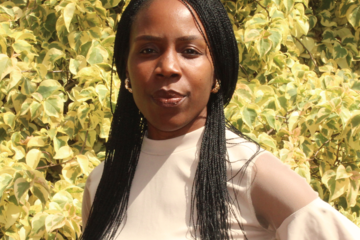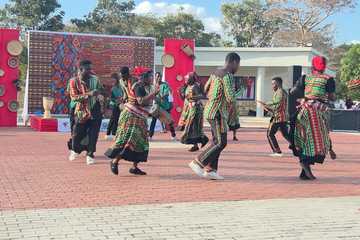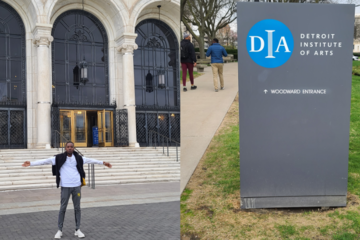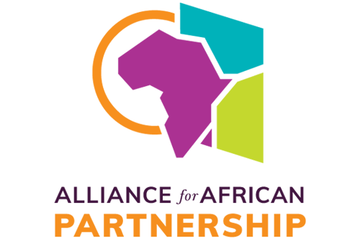Browse
Youth Empowerment
Michigan State University and the Alliance for African Partnership Awarded $895,000 Carnegie Grant
FOR IMMEDIATE RELEASE
Michigan State University and the Alliance for African Partnership Awarded $895,000 Carnegie Grant for REIMAGINE Project Advancing Graduate Education and AI in Africa
Michigan State University (East Lansing, Michigan) has been awarded a 36-month, $895,000 grant from the Carnegie Corporation of New York under its prestigious Higher Education in Africa program. The grant will support the Alliance for African Partnership (AAP) consortium’s efforts to advance innovative graduate education ecosystems across African universities and to develop a collaborative, transdisciplinary doctoral program focused on artificial intelligence.
The AAP REIMAGINE initiative supports forward-thinking strategies that reshape higher education for the future. Through this investment, AAP—MSU’s flagship platform for equitable and sustainable collaboration with African higher education institutions—will expand its work to strengthen graduate student environments, enhance supervisory and research cultures, and foster institutional systems that enable student success on the continent.
A key component of the project is the development of multiple Artificial Intelligence Doctoral Training Programs, designed to equip a new generation of African scholars with advanced AI expertise, research skills, and leadership capacity. The initiative will leverage MSU’s long-standing partnerships with universities across Africa, ensuring African-led direction, contextual relevance, and sustainability.
“The REIMAGINE Project is fundamentally about examining how doctoral education and research ecosystems across African universities can evolve to better support transdisciplinary scholarship in artificial intelligence,” said Dr. Jose Jackson-Malete, Co-Director of the Alliance for African Partnership and Project Lead for the Carnegie-funded REIMAGINE initiative. “This work is critically needed now. Without intentional investment in doctoral training, supervision systems, and collaborative research environments, Africa risks falling behind in shaping—and benefiting from—the rapid advances in AI that are already transforming societies and economies worldwide.”
Over the next three years, the project will:
Review and strengthen policies for graduate student mentorship, supervision, and research environments across AAP member institutions.
Support institutional innovations that promote student well-being, academic success, and professional development.
Launch a continentally grounded transdisciplinary doctoral program focused on artificial intelligence, expanding access to emerging fields that drive economic and societal transformation.
Foster deeper collaboration between MSU scholars and African research teams through joint programs, co-created curricula, and capacity-building initiatives.
Since its inception in 2016, AAP has worked across the consortium and beyond to promote equitable partnerships, research excellence, and sustainable development solutions. This new investment from Carnegie marks a pivotal milestone in scaling AAP’s impact on higher education transformation.
About the Alliance for African Partnership (AAP) AAP is a consortium convened by Michigan State University to promote collaborative, transdisciplinary partnerships among 10 member African institutions, MSU, and global stakeholders. The Alliance focuses on building capacity, supporting innovation, and advancing shared research priorities that address global challenges.
About the Carnegie Corporation of New York Founded in 1911 by Andrew Carnegie, the Carnegie Corporation of New York is one of America’s oldest philanthropic foundations focused on advancing knowledge and understanding through grants in education, strengthening U.S. Democracy, international peace and security, and higher education in Africa, supporting initiatives that promote civic engagement, reduce polarization, and foster global cooperation, continuing Carnegie's legacy of social progress. The REIMAGINE program supports bold, future-focused approaches to revitalizing higher education and strengthening global knowledge systems.
By:
Baboki Gaolaolwe-Major
Thursday, Jan 22, 2026
YOUTH EMPOWERMENT
+2
No Preview Available
Leave a comment
Africa Global Partnership Scholars
In an era where complex global challenges demand collective action, the need for international collaboration and knowledge sharing has never been more critical. Africa Global Partnership Scholars Program (Africa GPS) is a cohort-based program, designed for early to mid-career MSU faculty to create and deepen new scholarly partnerships with collaborators and peer institutions in Africa in support of MSU’s global mission.
PROGRAM OBJECTIVES:
Foster the development of a group of faculty members dedicated to establishing and enhancing international research connections, collaborating on solutions with African partners, and adopting a global perspective in their scholarly work
Support MSU’s 2030 strategic plan goal of discovery, creativity and innovation for excellence and global impact
Connect MSU faculty with potential collaborators and mentors in Africa, expand the scholars' international networks, and offer support for establishing long-lasting collaborations
Heighten global awareness and research dialogue
Elevate the status of MSU’s global mission
Capitalize on opportunities to leverage external resources and form partnerships
ELIGIBILITY FOR APPLICATION
Tenure-stream or fixed term faculty at Michigan State University without prior scholarly experience in Africa are eligible to apply for Africa GPS.
REQUIRED APPLICATION MATERIALS
As part of the application process, the applicant must submit the following materials:
Completed application questionnaire
An up-to-date curriculum vitae (max 4 pages)
A one-page statement that describes your reasons for applying, potential research focus, and if known, the AAP consortium institution and African country of interest for the collaboration. If needed, AAP can help identify the country, mentor and/or the collaboration partner based on the applicant’s interests.
A letter expressing strong support from the Chair/School Director/Dean. The letter should affirm:
The candidate’s international interest, experience, and/or research
The candidate’s strengths as a researcher within the context of unit expectations
The candidate’s proposed project will advance the mission and goals of the academic unit, be supported by the unit, and benefit international partners
Applicants are encouraged to obtain a commitment from their unit or college to provide a 20% cost share. While cost sharing is not required, preference will be given to proposals that include this match.
FUNDING
To facilitate the participation of faculty members selected as Africa GPS Fellows, AAP will provide support for the following:
Up to $10,000 in support of international travel and scholarly collaborations with a researcher and/or mentor at an AAP Consortium member institution. The $10,000 may be used to support the MSU faculty members’ individual travel, collaborative research activities or to bring an African partner to MSU.
Connection with potential collaborators, mentors, and institutions in Africa
Structured workshops on establishing and navigating international partnerships
Financial Guidelines:
The financial support must be expended prior to the end of the program (one year after awarded).
Preference will be given to applicants who provide a 20% match from the applicant’s unit, department or college.
PROGRAM EXPECTATIONS
Africa GPS participants are expected to develop a sustainable collaboration with peer researchers at an AAP consortium institution. As a result, within two years of being selected for the program, the scholar is expected to achieve the following outputs:
A collaborative research paper coauthored with their African collaborator to be submitted for publication.
A concept note of a proposal submitted to a funding agency to sustain the partnership with the African collaborator.
Progress reports submitted every six months to AAP documenting how the collaboration is progressing and any challenges that may have arisen.
Attend program orientation, professional development workshops organized by AAP, and other relevant events as shared by the AAP team.
SELECTION CRITERIA FOR GLOBAL RESEARCH FELLOWS
The criteria below will be utilized to evaluate candidates for their selection to the Africa GPS program:
Commitment Level: Applicants need to show a readiness to dedicate the necessary time to maximize the benefits of the Fellowship year, along with a proven scholarly potential that supports such a commitment.
Research Interest: Candidates should demonstrate a strong commitment to international research and articulate how participation in Africa GPS will contribute to their personal and professional development
Unit Support: Candidates must have strong support from relevant departmental or school and college administrators, indicated by enthusiastic recommendations.
Alignment of Interests: The applicant’s international research interests should align with the Africa GPS’s mission to foster excellence in international research.
Apply here: https://msu.co1.qualtrics.com/jfe/form/SV_bIS1j4JJxUE2voq
SELECTION OF FELLOWS
Applications are due by January 30, 2026. Application materials will be reviewed by a selection committee in International Studies and Programs. Scholars will be announced by May 2026. Funds must be transferred to selected scholars by June 30, 2026.
If you have any questions, please contact Justin Rabineau at: rabinea1@msu.edu
By:
Justin Rabineau
Monday, Dec 22, 2025
AGRI-FOOD SYSTEMS
+6

Leave a comment
AAP Steps Up Its Global Footprint at Falling Walls 2025
The Alliance for African Partnership (AAP) strengthened its global visibility this year with a significantly expanded presence at the Falling Walls Summit in Berlin, signaling a new phase in Africa’s engagement with one of the world’s leading platforms for science, innovation, and societal impact.
The momentum follows a fast-growing collaboration between AAP and the Falling Walls Foundation, an alliance that has already produced tangible results. LUANAR in Malawi became the first institution in the consortium to launch a combined Falling Walls Engage and Lab, followed by the University of Botswana, which introduced the Gaborone Lab in 2025 and is preparing to roll out the Engage program in 2026. For AAP, these developments are more than individual wins: they mark the beginning of a wider rollout across the consortium, designed to strengthen research communication and create a more connected science engagement ecosystem across Africa.
At this year’s Summit, AAP member universities made their strongest showing yet. Lab winners from LUANAR and the University of Botswana took the stage in Berlin, showcasing African innovation to an international audience of scientists, investors, policymakers, and global media. Senior leaders from across the consortium also attended, led by Michigan State University’s Vice-Provost for International Studies and Programs, Professor Titus Awokuse.
During the delegation meeting with Falling Walls’ Executive Director, Andreas Kosmider, there was clear enthusiasm about the trajectory of the partnership. Discussions focused on deepening African participation in next year’s Summit and widening the circle of collaborators to include government ministries, policymakers, and funding agencies, an effort aimed at opening new channels for African–German cooperation.
For AAP, the stakes are high. Strengthening research communication equips young African scientists to tell their stories compellingly, improving public understanding and increasing the influence of research on policy. The Labs, meanwhile, function as early-stage innovation pipelines, giving African entrepreneurs exposure, mentorship, and a global platform for emerging ideas. The partnership also enhances institutional visibility, positioning African universities as active players in global science diplomacy.
Planning has already begun for next year’s Summit, with AAP leaders working on a coordinated roadmap to ensure a more visible and more diverse African presence in 2026. The goal is not simply to attend, but to shape the agenda by bringing African voices, research, and innovation to the centre of the global conversation.
As AAP expands its Falling Walls footprint, the partnership is beginning to look less like a program and more like an ecosystem-building catalyst. It is strengthening the consortium internally, opening new possibilities externally, and giving African researchers and innovators a much-needed global stage. And if the early signs are anything to go by, the walls separating African science from global visibility are starting to crack, making space for a new era of collaboration and opportunity.
By:
Baboki Gaolaolwe-Major
Thursday, Dec 11, 2025
CULTURE AND SOCIETY
+3

Leave a comment
Culture in collaboration: repurposing folklore for youth empowerment
Africa, particularly Nigeria, has a teeming young population who attempt to creatively navigate rapidly shifting identities within an unstable economy. For them, storytelling becomes a powerful tool through which sense is made of their place in the world. My research on folklore reimagination interrogates how traditional narratives are transformed into contemporary artistic endeavour that reflect the social realities of the youth. Folklore reimagination thus becomes an avenue for skill acquisition and empowerment in a society plagued with mismanaged resources and youth unemployment. By perceiving folklore as a living resource rather than a mere relic of the past, my research attempts to revive cultural heritage into digital content for the screen, constituting a source of self-employment for young creatives. In addition to addressing SDG number 8 – decent work and economic growth, this research fosters partnerships between culture and performance, youth and communities, tradition and modernity, and between local narratives and a global audience, offering education opportunities and reduced poverty. The research goal is to develop a toolkit which serves as both a learning and teaching aid for students and teachers of creative writing, further resonating with SDG number 4. Besides offering a platform for creativity and skills acquisition leading to self-employment, this research provides a model for a cultural engagement that is rooted in heritage preservation, shared creativity, collaboration and mutual respect. The research, which began in 2022, is divided into three distinct phases – toolkit draft, evaluation and update. Phase one involves the draft of the toolkit, which is divided into 5 parts and provides ethical insights and guidelines on working with folklore from the point of collection until reimagination. Offering mostly a theoretical guide, this phase is completed, and phase two is in progress. Phase two demands working closely with student writers to test the toolkit draft. Through a close collaboration with my students, aspects of the toolkit are currently being tested for effectiveness. Through feedback provided by the students, the toolkit will be updated with practical guides and sample scenarios. Further updates are expected following curated workshops, writers’ conference and creative labs. The creation of this toolkit resonates with the theme for this newsletter - art in partnership. Currently under the mentorship of Dr Jeff Wray of Michigan State University and Professor Chinenye Amonyeze of University of Nigeria, this research highlights that art, generally and folklore in particular, is not just a memory of set time in history, but a flexible material that can be reshaped into performances and creative narratives with social and economic value, while fostering partnerships driven by art. Folklore reimagination is, at its heart, an art of cultural partnership which depends on collaborations between researchers and creatives. By centring youths as creative agents, it leverages heritage to build skills, empowerment and self-employment. In this partnership, cultural memory is perceived and treated as a resource for innovation and economic growth. This art of partnership is therefore a sustainable one built on shared stories – stories that bear identities shaped by the past, present and future.
By:
Baboki Gaolaolwe-Major
Thursday, Dec 11, 2025
CULTURE AND SOCIETY
+1

Leave a comment
2025 AAP Consortium Delegates Welcomed in Classic Warm Heart of Africa Style
Delegates to the AAP Consortium Meeting in Malawi were welcomed with a vibrant cultural reception on the afternoon of Sunday, June 8, 2025, at the Bingu International Convention Centre (BICC) Amphitheatre. The event offered a rich immersion into Malawi’s cultural heritage, from traditional dances that transported participants across the country, to rhythmic music echoing tales of generations past, complemented by a curated selection of local foods and beverages. Set in the warmth of Malawian hospitality, the reception also featured interactive activities celebrating African cultural diversity through language games and cultural lightning talks.
Reception Planning
The reception was carefully designed to celebrate cultural identity and diversity while ensuring an enjoyable and memorable experience for all attendees. Preparations began with identifying local performance groups whose artistry authentically reflects the Malawian cultural brand. Consultations with selected groups ensured a thoughtful balance of energetic and soothing performances suited to a diverse audience, ultimately creating a programme that offered a cultural tour of Malawi through music and dance. Organisers also coordinated with the hosting hotel to incorporate Malawian cuisine on the cocktail menu, showcasing the country’s culinary heritage. With the performances and menu in place, the reception hosts curated additional interactive activities to promote cultural exchange and engagement among delegates.
Performances
The Malawi National Dance Ensemble, popularly known as the Kwacha Cultural Troupe, headlined the afternoon. Established in 1987, the renowned 30-member troupe delivered a captivating sequence of traditional dances representing Malawi’s regions. Their repertoire included Beni, Chimtali, Chisamba, Chiterera, Mjedza, Malipenga, Ingoma, Mganda, Vimbuza, and Gule Wamkulu—the iconic masked dance of the Chewa people. Adding to the ambiance, Owen Mbilizi and his team offered a rich musical experience featuring original compositions and Malawian classics, blending skilled instrumentation with harmonious vocals. Delegates responded with enthusiastic applause and cheers throughout the performances.
Local Foods
Participants enjoyed an assortment of local delicacies, including mandazi, zitumbuwa (banana fritters), malambe (baobab) juice, and thobwa (sweet beer), alongside familiar continental snacks. The refreshment break provided an informal space for delegates to mingle, exchange reflections, and deepen their appreciation of the cultural showcase.
Significance
The cultural reception successfully highlighted Malawi’s artistic and culinary traditions while fostering a shared appreciation for cultural diversity among delegates. It was an afternoon filled with warmth, laughter, and a strong sense of community, the perfect icebreaker for the week’s engagements.
By:
Baboki Gaolaolwe-Major
Tuesday, Dec 9, 2025
CULTURE AND SOCIETY
+1

Leave a comment
From Lens to Learning: Alex Mkwizu’s Transformative MSU Journey
When Ibn Battutah said, “Traveling—it leaves you speechless, then turns you into a storyteller,” in his famous volumes Travels of Ibn Battutah, little did I know how profoundly this wisdom would echo throughout my eight-day experience at Michigan State University (MSU), East Lansing. I had the honor of attending as the overall winner of the InVision Africa Photography Competition, curated and sponsored by the Alliance for African Partnerships. This MSU initiative champions collaboration with African universities in art, culture, language, and other fields.
My time at MSU was eye-opening, filled with warm introductions to professors and artists. I met Professor Peter Glendinning from the Kresge Art Center, whose expertise in photography was inspiring; Professor Susan Wyche, who specializes in Human-Computer Interaction (HCI); and Mr Vadu Rodrigues, a Master of Fine Arts candidate, from whom I learned how his personal influences shaped his narrative and storytelling in photography. I also met many other colleagues, learning from their diverse experiences and creative processes.
These key encounters with experts and practitioners across different artistic disciplines opened doors for me to continue exploring, collaborating, and discovering new opportunities as a multidisciplinary creative artist passionate about the intersection of data, technology, and human-centered storytelling.
One of the most memorable encounters was with Professor Peter Glendinning and his body of work Attached to the Soil, a brilliant photographic project consisting of fifty portraits, oral history-based stories, and metaphoric representations of South African youth. He shared fascinating insights into his process, including an old, rare tool he once used to achieve a stroboscopic effect before the era of advanced cameras and editing software. What stood out most to me was that each photograph’s story was told from the perspective of the subject themselves, a powerful approach to narrative photography.
Another remarkable interaction was with Mr. Vadu Rodrigues and his artistic initiative Positive Africa, which seeks to challenge negative and biased narratives about Africa through photography and other art forms. Spending time with him in his studio was deeply insightful. I admired his practice of carrying a small notebook to document daily experiences and visual ideas that later influence his creative work. Observing his process from conceptualization to a finished art piece was a masterclass in intentional storytelling.
The culmination of this experience profoundly influenced my growth as a creative technologist and multidisciplinary artist. It also opened new doors for collaboration, one of which came through the MSU Museum CoLab Studio. I learned about a call for artists to create a piece exploring AI singularity in all its forms. Having subscribed to the studio’s newsletter, I received the announcement and decided to apply with a concept for a Virtual Reality immersive experience: a VR tribunal where sentient AIs bring cases against humans. Participants take the role of the defendant, while a generative AI judge, UbuntuBot, presides, modelled on African communal justice systems. The project merges storytelling, ethics, and digital futures.
As the old proverb goes, “Luck is when opportunity meets preparedness.” Fortunately, I was selected as one of the artists to collaborate with the MSU CoLab Studio, supported by a seed grant to bring this piece to life and exhibit it at the MSU Museum.
While the journey has only just begun with MSU Art Community, the experience with the Invision Africa Photography Competition and the exposure and connections made within MSU’s artistic community have left a lasting and transformative impact. It will continue to shape my creative path and remain a defining part of my artistic journey.
By:
Baboki Gaolaolwe-Major
Tuesday, Dec 9, 2025
CULTURE AND SOCIETY
+1

Leave a comment
Am glad to be here
By:
Hassan William
Friday, Nov 21, 2025
YOUTH EMPOWERMENT
Leave a comment
Am glad to join this group
By:
Hassan William
Friday, Nov 21, 2025
YOUTH EMPOWERMENT
Leave a comment
Am very excited to join you guys on this group
By:
Hassan William
Friday, Nov 21, 2025
YOUTH EMPOWERMENT
Leave a comment
African Futures Research Leadership Program - Cohort 6 Call for Applicants
AAP AFRICAN FUTURES RESEARCH LEADERSHIP PROGRAM
Artificial Intelligence in Africa: Transdisciplinary Innovations for Sustainable Futures
Cohort 6 Call for Applicants
Alliance for African Partnership (AAP) invites applications for the sixth cohort of the African Futures Research Leadership Program. This competitive visiting scholar program supports early career researchers from AAP consortium universities to collaborate for one year with faculty members at Michigan State University (MSU) and their home institutions. The program focuses on strengthening skills in impactful research, curriculum development, innovative teaching, scholarly and policy writing, dissemination of research results, and grant proposal development. Scholars will also participate in a structured professional development program while building meaningful and lasting connections with MSU faculty and fellow scholars.
The primary goal of the African Futures Program is to strengthen the capacity of emerging African researchers to become scientific leaders in their communities. The program seeks to foster long-term partnerships with MSU faculty, co-create innovative solutions to Africa’s challenges, and cultivate the next generation of research mentors and leaders.
AAP invites applications from early career researchers to join the upcoming cohort, which will begin virtually in February 2026. Scholars will spend September through December 2026 at MSU for the in-person phase of the program, followed by continued virtual collaboration through early 2027. Each scholar will receive a small grant to support research, teaching, and professional development activities, including conference participation and publication. Scholars will also receive a stipend during their time at MSU, visa support, and round-trip travel from their home institution.
Potential Teaching and Research Areas
The 2026 theme, “Artificial Intelligence in Africa: Transdisciplinary Innovations for Sustainable Futures,” highlights the potential of AI to address Africa’s most critical challenges and opportunities. AI research must be ethical, contextualized, and socially responsible, drawing insights from science, engineering, the arts, business, culture, and society. In addition to thematic research, scholars will contribute to the development of curricula for a transdisciplinary doctoral program in AI in Africa and explore innovations in teaching and learning.
We particularly encourage cross-disciplinary projects exploring AI’s transformative potential in:
Agri-food systems – leveraging AI for food security, sustainable agriculture, and resilient supply chains
Health and nutrition – applying AI in disease prevention, diagnostics, personalized medicine, and strengthening health systems
Climate change, water, energy, and environment – using AI for mitigation, adaptation, monitoring, and sustainable resource management
Ethics, governance, and society – integrating human rights, accountability, and inclusivity in AI design and deployment
Culture and the arts – examining how AI interacts with African languages, creative expression, heritage preservation, and digital storytelling
Engineering and science – developing AI-driven technologies suited to African contexts
Education – enhancing equitable access to learning, bridging digital divides, and improving pedagogy through AI
Business and entrepreneurship – fostering inclusive growth, financial technologies, and youth-led AI innovations to shape Africa’s digital future
Through transdisciplinary collaboration, the program aims to promote AI research and teaching that bridges technical and social disciplines, ensuring innovation reflects Africa’s diverse values and aspirations.
Program Benefits
Professional Development – Structured workshops on equitable partnerships, teaching innovation, academic time management, proposal development, budgeting, and research communication to enhance research, teaching, writing, and leadership skills
Leadership Development – A research leadership retreat focused on building leadership competencies, self-reflection, and career development for research advancement
Collaboration Networks – Each scholar will collaborate with MSU and home institution partners. Collaborators may conduct reciprocal one-week visits. Scholars will also join AAP’s network of researchers at MSU, across Africa, and globally to foster lasting institutional partnerships
Expected Outcomes
By the end of the program, each scholar and their team are expected to achieve at least:
Submission or publication of one to three joint manuscripts
Submission of at least one grant proposal
Presentation at one or more academic or professional conferences
Collaborations are designed to extend beyond the program’s duration. Scholars are encouraged to engage broadly with MSU faculty and maintain partnerships after completion. Participants must submit regular progress reports to AAP and their home institution focal point. Failure to meet program or partnership expectations may result in early termination.
Eligibility
Citizenship in an African country
PhD awarded within the last 10 years
Current employment as Academic Staff at one of the AAP African member universities including Egerton University, Makerere University, University of Dar es Salaam, Lilongwe University of Agriculture and Natural Resources, University of Botswana, University of Nigeria, Nsukka, University Cheikh Anta Diop, Yambo Ouologuem University of Bamako, United States International University-Africa, or University of Pretoria
Official approval of leave or sabbatical for the in-person phase
A home institution partner committed to collaborating throughout the program
Research aligned with the program’s thematic areas, focusing on AI in Africa
Submission of only one proposal per applicant in this round of funding
Application Requirements
An updated CV outlining professional accomplishments
A one-page letter of interest detailing alignment with program priorities, research approach, and potential societal impact
Names of up to three potential MSU faculty collaborators (identified from MSU department websites; applicants should not contact faculty directly—AAP will initiate contact)
Two relevant peer-reviewed publications
Two professional references providing context on the relationship and an assessment of the applicant’s expertise
A one-page letter from the home institution collaborator confirming willingness to participate and travel to MSU for collaboration
A one-page endorsement letter from the Head of Department approving leave
A one-page letter of support from the institution’s AAP Focal Point
Selection Criteria:
Professional merit, scientific ability, and potential for career impact (evaluated through CV, publications, letters, and references)
Institutional assurance of continued employment and support post-fellowship
Commitment to return to the home country after the fellowship
Consideration for diversity across disciplines, institutions, and regions. Priority will be given to projects that demonstrate transdisciplinary approaches integrating technology, culture, ethics, and societal impact
EXTENDED DEADLINE: Applications are due by November 28, 2025
Apply: https://msu.co1.qualtrics.com/jfe/form/SV_eVb2iErQhRpmAPs
For questions, please contact José Jackson-Malete at jacks184@msu.edu or +1-517-884-8587.
This project is made possible with the philanthropic support of Carnegie Corporation of New York
By:
Justin Rabineau
Wednesday, Nov 19, 2025
AGRI-FOOD SYSTEMS
+7

Leave a comment
Rapid Response Funding: Direct Support Stream
Deadline: Dec 31, 2025
Donor: United Nations Women's Peace & Humanitarian Fund
Grant Type: Grant
Grant Size: $10,000 to $100,000
Countries/Regions: Afghanistan, Albania, Algeria, Angola, Argentina, Armenia, Azerbaijan, Bangladesh, Belarus, Belize, Benin, Bhutan, Bolivia, Bosnia And Herzegovina, Botswana, Brazil, Burkina Faso, Burundi, Cambodia, Cameroon, Cape Verde, Central African Republic, Chad, China, Colombia, Comoros, Congo (Brazzaville), Congo DR, Costa Rica, Cote DIvoire (Ivory Coast), Cuba, Djibouti, Dominica, Dominican Republic, Ecuador, Egypt, El Salvador, Equatorial Guinea, Eritrea, Ethiopia, Fiji, Gabon, Gambia, Georgia, Ghana, Grenada, Guatemala, Guinea, Guinea-Bissau, Guyana, Haiti, Honduras, India, Indonesia, Iran, Iraq, Jamaica, Jordan, Kazakhstan, Kenya, Kiribati, North Korea, Kyrgyzstan, Laos, Lebanon, Lesotho, Liberia, Libya, Macedonia, Madagascar, Malawi, Malaysia, Maldives, Mali, Marshall Islands, Mauritania, Mauritius, Mexico, Micronesia Federated States Of, Moldova Republic Of, Mongolia, Montserrat, Morocco, Mozambique, Burma(Myanmar), Namibia, Nauru, Nepal, Nicaragua, Niger, Nigeria, Niue, Pakistan, Palau, Panama, Papua New Guinea, Paraguay, Peru, Philippines, Rwanda, Saint Helena, Saint Lucia, Saint Vincent And The Grenadines, Samoa, Sao Tome And Principe, Senegal, Sierra Leone, Solomon Islands, Somalia, South Africa, Sri Lanka, Suriname, Swaziland, Syria, Tajikistan, Tanzania, Thailand, East Timor (Timor-Leste), Togo, Tokelau, Tonga, Tunisia, Turkey, Turkmenistan, Tuvalu, Uganda, Ukraine, Uzbekistan, Vanuatu, Venezuela, Viet Nam, Wallis And Futuna, Yemen, Zambia, Zimbabwe, Montenegro, Serbia, Kosovo, South Sudan
Area: Humanitarian Relief, Peace & Conflict Resolution, Women & Gender
The Women’s Peace and Humanitarian Fund (WPHF) Direct Support Stream is accepting concept notes from eligible applicants in countries with active peace processes.
For more information, visit https://wphfund.org/rrw-direct-support/
Premium Link: https://grants.fundsforngospremium.com/opportunity/op/rapid-response-funding-direct-support-stream
By:
Baboki Gaolaolwe-Major
Thursday, Oct 2, 2025
YOUTH EMPOWERMENT
+2
No Preview Available
Leave a comment
CFAs: Princess Sabeeka Bint Ibrahim Al Khalifa Global Award for Women's Empowerment
Deadline: Mar 20, 2026
Donor: UN Women
Grant Type: Awards, Prizes and Challenges
Grant Size: $10,000 to $100,000
Countries/Regions: All Countries
Area: Individuals, Innovation, Leadership, Gender Equality, Women & Gender
The UN Women has launched a prestigious global award to recognize and celebrate the outstanding efforts of individuals, civil society, public institutions, and private sector actors working toward gender equality and the empowerment of women and girls.
For more information, visit https://www.womenglobalaward.org/en
Premium Link: https://grants.fundsforngospremium.com/opportunity/op/cfas-princess-sabeeka-bint-ibrahim-al-khalifa-global-award-for-womens-empowerment
By:
Baboki Gaolaolwe-Major
Thursday, Oct 2, 2025
YOUTH EMPOWERMENT
+1
No Preview Available


Leave a comment